|
It (Might Have) Happened Here
The long-awaited television adaptation of Len Deighton’s ‘alternative history’ thriller SS-GB is scheduled to be shown by the BBC over five Sunday evenings starting this month. And here’s the SPOILER ALERT: it’s very good.
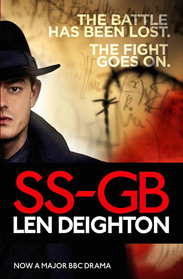
The initial premise is that the Germans won the Battle of Britain in 1940 and London and the south of England is now occupied territory. Crime, however, goes on and ace detective (and war widower) ‘Archer of the Yard’ has to solve murders whilst keeping one eye over his shoulder where his new masters from the SS and the SD security service loom over him. How far can Archer go upholding the law without collaborating with his unwanted Nazi overlords and how long before he is drawn into the activities of the British resistance? And then there’s the question of getting the Americans into the war and the small matter of some atomic secrets.
I was lucky enough to attend a special preview of the first episode and from the opening ‘Spitfire scene’ it became clear this was going to be quality viewing. The handsome Sam Riley (who played Pinkie in the remake of Brighton Rock) plays Archer and the wonderful James Cosmo (two Trainspottings and Game of Thrones) is his sidekick at Scotland Yard, Harry Woods – and watch in particular for his wordless drunk act in Episode 1.
The series, adapted by the scriptwriters of Skyfall and SPECTRE, is essentially a five-hour big screen movie, but one which eschews CGI for close hand-held camera work in and around a very solid London. The other bonus is that the leading German characters are played by excellent German actors
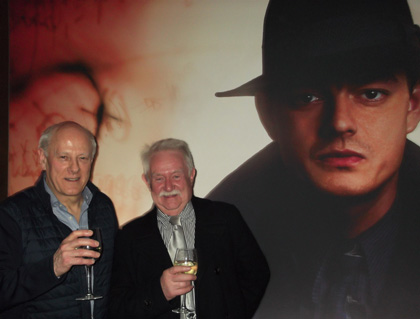
Sadly, Len Deighton could not be there to see his 1978 novel done justice, although I hear he was pleased with the result, but I was delighted to meet his biographer Edward Milward-Oliver, author of the definitive The Len Deighton Companion.
Diamond Fest Guest
Almost simultaneously I learned that Ann Cleeves will be both the recipient of this year’s Diamond Dagger award from the Crime Writers Association and a guest of honour at the Crimefest convention held in Bristol, 18-21 May.

Ann will be in Bristol joining other honoured guests including Anthony Horowitz, Peter Lovesey and Professor Barry Forshaw, who will be parking his snow shoes under the moderator’s table to introduce a panel of Icelandic ‘Queens of Crime’ (plural) proving there is more than one.
I was reminded of last year’s Crimefest which concluded with a highly intellectual quiz – I’m Sorry I Haven’t A Cluedo – between two teams of crime writers, among them Alison Bruce and Thomas Mogford. Via the beating of jungle drums I hear that both Alison and Thomas have new novels out or about to be out, though their publishers seem to have adopted the marketing strategy of ‘promotion by stealth’ and as yet I know nothing about them. I intend to investigate before next month’s column.
Legal Notices
For legal reasons (not being invited) I did not attend the lavish ‘Warming the Blood’ winter crime party thrown by the Crime Files team of the Hachette publishing empire last month. Consequently, I am spectacularly uninformed about forthcoming crime fiction from the Hodder, Headline, Quercus, Riverrun, Mulholland and John Murray imprints.
Which is a pity really, as I would have loved to share any news and insights I might have gleaned on forthcoming titles such as Sarah Hilary’s Quieter Than Killing in March which could well be the fourth novel to feature Detective Inspector Marnie Rome – ‘an appealing creation’ according to learned friends on The Times.
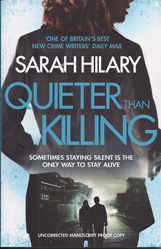 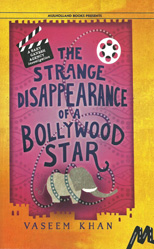
Nor can I tell you anything about The Strange Disappearance of a Bollywood Star by the charming Vaseem Khan, whom I met back in the days when I received invitations. I suspect – and this is just a guess – that Vaseem’s new novel will have something to do with India and may well feature a baby elephant. Beyond that, we will just have to wait and see what publication in May will bring.
Fortunately, I have a ‘mole’ inside the publisher’s Berchtesgaden-style retreat who reliably informs me that my old pal Lindsey Davis has a new novel coming out in March featuring Roman ‘enquiry agent’ Flavia Albia. Naturally, I know nothing of the book except that its cover design has not yet been revealed (even, presumably, to those who did get an invitation) but as the title is The Third Nero, I offer the following as a suggestion;
  
And my ‘mole’ has certainly earned this month’s anonymous brown envelope (one day I really must put some money in them) by smuggling me an advance proof of Philip Kerr’s latest Bernie Gunther novel Prussian Blue, which will be available to mere mortals in April. I probably should not reveal that this is a direct follow-on from Philip’s excellent The Other Side of Silence of last year, set initially in 1956 but with flashbacks to 1939, or that it is an absolutely cracking thriller.
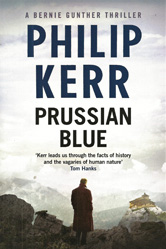
I suppose I am also not allowed to point out that Bernie Gunther will return next year in Greeks Bearing Gifts, though I will as I think Bernie Gunther is one of the great characters of crime fiction and Kerr’s thrillers provide a rich background of detection, espionage and modern history which he weaves expertly around stories of betrayal and human weakness.
Party Time (News in brief)
I was delighted, nay grateful, to be invited to the launch party of Sirens by debut author Joseph Knox (and published by Doubleday) on a cold January evening in London’s West End when a sudden snow storm sent many, myself included, scurrying to find shelter in one of the many public dwellings in Soho provided for just such emergencies. (Mine, I noticed, was called The Pillars of Hercules and was famously used by Karl Marx when in need of shelter during his stay in London some years ago.)
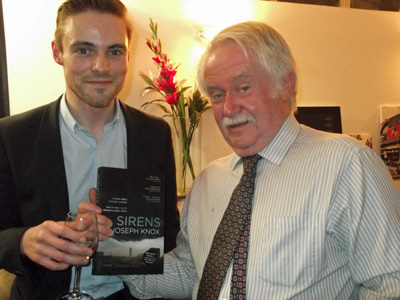
Sirens, a ruthlessly honest portrayal – though hopefully not a documentary – of the dark side of Manchester was rumoured to have been eight years ‘in the making’ but is has emerged as a frighteningly competent, full-blooded crime novel and the only advice I could pass on to the disgracefully-young Joseph Knox was the he should always be accidentally holding a copy of his latest work whenever a photographer is passing. However, as Sirens went immediately into the Waterstones Top Ten bestseller list, any advice I might offer is clearly superfluous.
Golden Oldies
One piece of advice I insist on giving to anyone who will listen is to read the ‘Golden Age’ mysteries of Anthony Berkeley which feature his amateur sleuth Roger Sheringham.
Anthony Berkeley Cox (1893-1971) is perhaps best known today for his classic Malice Aforethought which he wrote under the pen-name Francis Iles, but his series of ten detective novels featuring Roger Sheringham proved he was a major player in the 1920s and 30s and an important figure in British crime fiction, not the least for his later career as the crime fiction reviewer for the Daily Telegraph.
Sheringham, ostensibly a journalist, bestselling novelist, freelance crime columnist and gentleman sleuth, has also been affectionately described as the Golden Age’s “breeziest and booziest detective”. He was also prone (quite often really) to making mistakes when it came to identifying the murderer.
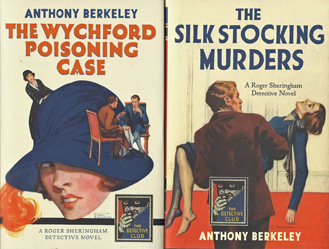
Now splendidly republished under the famous Collins Crime Club imprint, The Wychford Poisoning Case, from 1926, is one of the rarest Berkeley titles and, indeed, the only one I had never read until now. More well-known is The Silk Stocking Murders from 1928, inspired (like Wychford) by real murder cases.
All Berkeley’s books were inventive, full of sly humour and often had solutions which were never clear cut – just like life, really. He was a genuine innovator and is credited with early experiments in the psychological crime novel and the concept of the ‘serial killer’ –though we should not hold that against him.
Keeping Up With The Jameses
If anyone deserves the title ‘the crime writers’ crime writer’ it could be James Tucker, or rather his pen-name Bill James, as Frances Fyfield, Val McDermid, Peter Guttridge and John Harvey have all publicly declared themselves to be fans of his fiction over the years.
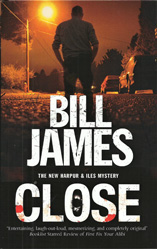
Synonymous with his Harpur and Iles police procedurals, of which Close published by Severn House this month is the thirty-fourth, Bill James long ago proved himself to be the consummate professional when it came to crafting mesmerising crime novels in distinctive, clear prose. Close will not disappoint his legion of fans as it cheekily riffs on the Billy Wilder film Sunset Boulevard and if you know the way the story of that film is told (from the opening shot of a swimming pool), then you’ll appreciate Bill James’ cheeky, but enthralling, take on the topic of ‘unreliable narrators’.
Breaking News
I am always suspicious when a publisher flags up a forthcoming title as an author’s ‘breakout’ or ‘breakthrough’ book. It rather suggests that the author, or perhaps the publisher, hasn’t been trying hard enough until now. It is also curious that American Brad Parks’ new novel Say Nothing, published next month by Faber, is promoted as a ‘breakout’ given that it is the author’s first novel tobe published in the UK.
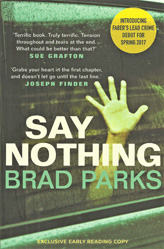
The novel comes with fulsome advance blurbage (a word I’ve just made up) from some well-known names in the business: Lee Child, Jeffrey Deaver, Sue Grafton, Joseph Finder, William Landay and Chris Pavone. Such a list of celebrity supporters would be remarkable for a debut novel, although of course this isn’t a debut novel as Brad Parks (a seasoned US newspaper journalist) is the author of a series of award-winning thrillers, six so far, featuring investigative reporter Carter Ross, which actually sound very interesting, though none have been published here.
Say Nothing is, I suppose, a cross between the domestic noir and the legal thriller schools. A Federal judge on the eve of making a court ruling on a drug-dealing case is threatened and manipulated by villains who have kidnapped his two young children. The judge and his wife (who plays an important part in the book’s resolution) do what all intelligent characters in high profile jobs in fiction do – they do not go to the police but tackle the problem themselves.
There are some effective moments of suspense and unease in this workmanlike but overlong thriller but whether it will be a ‘breakout’ for the author, at least in the UK, remains to be seen. It will certainly appeal to fans of Harlan Coben and John Grisham, and they seem to be doing alright.
An Eagle Coming In To Land
Rory Clements is best known for his John Shakespeare historical mysteries set in Elizabethan England, but for his latest – Corpus [Zaffre] – he moves up to the twentieth century and into classic Jack Higgins/Harry Patterson territory.

The setting is late 1936, when Europe was sketching the outlines of World War II on the back of an envelope, the Spanish Civil War was in full swing, a fair chunk of the British Establishment thought Hitler wasn’t such a bad egg after all and in Russia, Stalin was purging like mad. Naturally then, most of the action takes place in Cambridge, a hot bed of political extremes, intrigue and, as we all now know, spies.
The plot of Corpus involves a Nazi plot to keep Edward VIII – on the verge of abdication – on the throne, some smuggled Spanish gold, Russian agents both Red and White, some gruesome murders, lots of subsidiary political skullduggery, three young female characters reminiscent of the Mitford gals, a rather unlikely action hero in the form of an American professor of Elizabethan history (of course) and – dare I say it? – the ghost of Kim Philby. There is, in short, plenty going on here.
Rory Clements manages to keep his (and his hero’s) Elizabethan interests in check but he does betray himself at one point when he describes a country pub as offering a selection of half a dozen ales and beers. Now in Tudor times, there was a clearly understood difference between ales and beers, the latter being flavoured with hops but by 1936 (in fact probably by 1636) ales were also flavoured with hops and the term ale was accepted as a type of beer, just as stout, lager, porter and barley wine were types of beer; thus the phrase ‘ales and beers’ is the equivalent of saying ‘oranges and fruit’ to describe what is on offer in a greengrocer’s shop.
Neither would the landlord of a rural Cambridgeshire pub in 1936 have said ‘The keg’s new on today’ when defending the quality of his beer, as ‘keg beer’ had only just been developed and was not readily available anywhere except, famously, the East Sheen Lawn Tennis Club in London (where the head brewer at the nearby Watney brewery was a member). In fact it was soon to be unavailable anywhere as the metal needed for pressurised kegs was diverted into the production of Spitfires.
However, only a pedant with over 20 years’ active service in the brewing industry would notice such things.
|
|
Incoming!
It was good to hear Ted Allbeury and his books mentioned on Radio 4 last month. In his lifetime, Allbeury (1917-2005) was a wartime counter-intelligence officer – and one of the few British agents parachuted into Nazi Germany – a Cold War spy, an advertising executive, the managing director of a pirate radio station in the Sixties and then the best-selling author of high quality spy fiction which found, perhaps unusually, a large and loyal female readership.

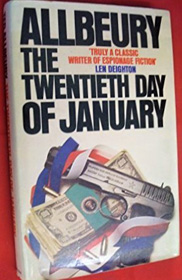
The item on Radio 4 consisted of an interview with Allbeury’s literary agent who described the author’s 1980 novel The 20th Day of January, the plot of which revolves around an incoming American President (the date being Inauguration Day) who has been got at/blackmailed/ planted by the Russians for whom he will be a stooge once in office.
Which of course is an outrageous idea; one that could surely only be mooted in fiction. Quite why the plot of a novel published 37 years ago should make the news in January 2017, though, is completely beyond a simple soul like me.
Holmes Sweet Holmes
Whilst controversy still rages over the latest and possibly last BBC series of Sherlock, one bone of contention over the office water-cooler being the roles given to female characters in the modern adaptations, the latest novel by Michelle Birkby tackles the problem head on by revealing the real brains behind the front door of 221b Baker Street.
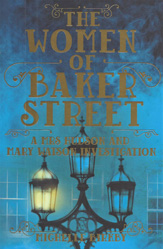

The Women of Baker Street, published by Pan next month is an engaging mystery featuring that over-looked detective duo of Mrs Hudson and Mrs Mary Watson, proving the old adage that behind every successful man, there is a pleasantly surprised woman.
The story begins with Mrs Hudson as a patient in St Barts hospital and the book provides a splendid Christie-like plan of the ward lay-out, which becomes vital information given that the ward has an unusually high mortality rate.
Spy the Beloved Country
I have been a fan of the work of South African crime writer Mike Nicol for several years now and his latest, Agents of the State, now available from Old Street Publishing, does not disappoint as a vibrant and visceral example of modern espionage fiction which roams effortlessly from Africa to Europe and back again. The main protagonist is secret agent Vicki Kahn on her first ‘going foreign’ mission and whilst she struggles to control a gambling addiction in Belgium and Berlin, her surfer boyfriend Fish Pescado – one of the most laid-back private eyes in the business – takes on a case involving the assassination of a rebel Colonel from the Central African Republic. Vicki’s mission and Fish’s case are destined to collide, proving that political chicanery, double-dealing and spying are not the preserves of us old cynics in the northern hemisphere.
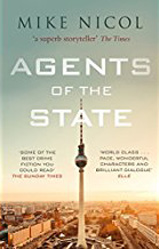 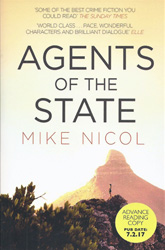
In last month’s column I gave advance notice of Agents of the State and I am afraid I may have misinformed my reader. The image I showed was the cover of the advance proof of Mike Nicol’s new book, but the finished copies have the cover on the left (above).The lesson it appears is that a cover featuring modern day Berlin will set better than a Cape Town scene; something I am sure was a valid assumption in the 1960s (think Funeral in Berlin, The Quiller Memorandum, A Dandy in Aspic etc.), but with Checkpoint Charlie and the Berlin Wall now long gone as iconic images of the fictional spy, and South Africa now recognised as an international hub of crime fiction, my vote goes to the cover nearer to home.
Do Mention The War
I am sincerely looking forward to the latest (to be published here) novel by Ben Pastor featuring the wartime adventures of aristocratic Wehrmacht officer Martin Bora, thus giving lie to the late, great Gore Vidal’s maxim that ‘when a friend succeeds something inside me dies’.
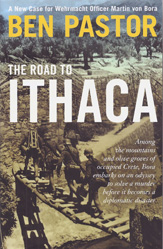
The Road To Ithaca, from the ever inventive Bitter Lemon Press next month, follows Ben Pastor’s fascinating hero (a soldier who refuses to consider life cheap, despite the inclinations of his Nazi superiors) on a mission to Crete in May 1941 to look into the murder of a Red Cross official (and friend of Heinrich Himmler) during the German invasion of the island. I am expecting, as usual, that the historical detail, both military and in this case archaeological, will be both accurate and cleverly woven into the fabric of the story, for Ben Pastor is not only an expert story teller, but also an archaeologist.
And here I must declare an interest, for I have known Ben (Verbena) Pastor for a number of years and am hoping to meet up with her at this year’s Chianti Crime Festival in Pisa in June. Ben, who is Italian but lived and taught in America for many years, writes in English and it is a mystery to me why her Martin Bora thrillers take so long to make it into the UK market, because they really are very, very, good, as much of the rest of Europe already knows. Get to know them before Brexit cuts the continent off for good.
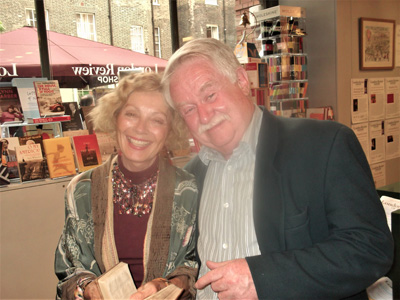 
And I am not just saying that because Ben, wearing her archaeology hat, once made a very interesting discovery during the excavation of an Etruscan site in Northern Italy…
Roar of the Crowd
I have not yet had time to read Seas of Snow, a debut psychological thriller by former BBC producer Kerensa Jennings, but I will because it has come into being through a time-honoured, but forgotten method thanks to publishing house Unbound.
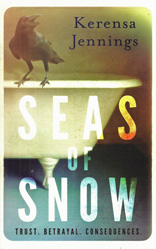
In the late eighteenth and early nineteenth centuries, the costs of publishing many a popular book were covered by advance subscriptions from enthusiastic readers. Today I believe this technique is known as ‘crowd funding’ and is carried out on the jolly old interweb.
As someone who does not have too much truck with modern fads – someone who has never stopped playing vinyl recordings and is bemused why Betamax video-tapes are so rare – I am delighted to see such a procedure reinvented for the electronic age. I will immediately investigate methods of ‘crowd funding’ a personal pension, for surely I deserve one.
Inducements
When yet another thriller of 480+ pages arrives for review accompanied by a miniature of vodka courtesy of the publisher, one is tempted to respond with: We’re going to need a bigger bottle.
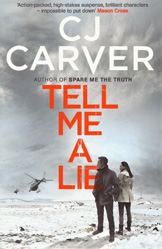
However, it seems as if the vodka is not only appropriate to the Russian setting but also necessary to calm the reader’s nerves as Tell Me A Lie by C.J. Carver, from Zaffre, if the recommendations promoting the author are to be believed. Praise for her action-packed thrillers comes from Lee Child, Harlan Coben, Mick Herron, Jack Grimwood, Isabelle Grey, Mason Cross, Meg Gardiner, Simon Kernick, Maxim Jakubowski and – best of all – ‘Andy Kirk, London cab driver for fifteen years’. Now there’s an opinion I will take note of.
Dictionary Corner
Newspapers and popular magazines (notably Reader’s Digest) used to run regular columns urging readers to Improve Your Word Power. I have often held the view that to do that very thing, you could do far worse than read crime fiction and I will give two examples from my recent reading.

In Under The Harrow by Flynn Berry (in paperback from Weidenfeld & Nicolson this month), a passenger on a train from London to Oxford sees two boys running along the platform of a local station the train is passing through. The boys run alongside the slow-moving (Virgin?) train then “jump a low wall and disappear down the berm.”
Now I realise I have had a sheltered upbringing and live what many would call the life of a recluse, but I cannot recall anyone ever using the word ‘berm’ in normal conversation to describe a man-made raised platform or barrier, nor even in archaeology when describing a particular form of earth barrow, although I freely admit that the Bronze Age was never really my thing. I have certainly never heard of a railway station platform called a berm, though of course it may well be a common usage in America.
Debut author Flynn Berry is clearly not a native British person as at one point in the dark and brooding Under The Harrow a character buys (from the refreshment trolley on the train) ‘a Twix bar…and an Aero’. No! One may purchase, in extremis, a Hershey’s Bar or, to help one work, rest and play, a Mars Bar, but a Twix is always just ‘a Twix’

And I am indebted to the excellent 1948 psychological thriller The Woman in the Sea by Shelley Smith, for reminding me of the wonderful phrase ‘Caustic persiflage’ which I had not heard or read for many moons. I am now determined to insert ‘caustic persiflage’ into everyday conversation at every given opportunity.
My very first experience of increasing my word power through crime fiction was a discussion many years ago with my old contubernalis (there’s another one) Colin Dexter who told the story of an early disagreement with an editor over a word in an early Inspector Morse novel.
As I remember Colin’s story, the scene was a church and Morse was observing a cleaning woman moving through the pews ‘boustrophedon’, which comes from the Greek and means to move (or read, as in ancient scripts) sideways fromright to left and then left to right. Colin’s editor objected to the fact that no-one would know what that meant and Colin, with aplomb and great wisdom, replied: ‘Well, they can look it up, can’t they?’
The Sweetest Blurb
One of the most interesting cover ‘tags’ I have ever seen comes with my splendid advance proof of Sweetpea by C.J. Skuse which will be published in April by the HQ imprint of HarperCollins.
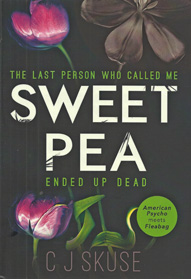
The tag, or ‘flash’ thumbnail description sums up the book as: American Psycho Meets Fleabag, which presupposes a reader who is old enough to have been both shocked (and possibly nauseated) by Brett Easton Ellis’ infamous American Psycho from 1991 and game enough to be shocked (and sent into hysterics) by the savagely funny Fleabag, the one-woman tour-de-force by Phoebe Waller-Bridge as broadcast (streamed?) on BBC 3 last year.
So it looks like I am the target demographic for once and I am greatly looking forward to reading Sweetpea.
Tune in next month for yet
more caustic persiflage,
Toodles,
The Ripster.
|